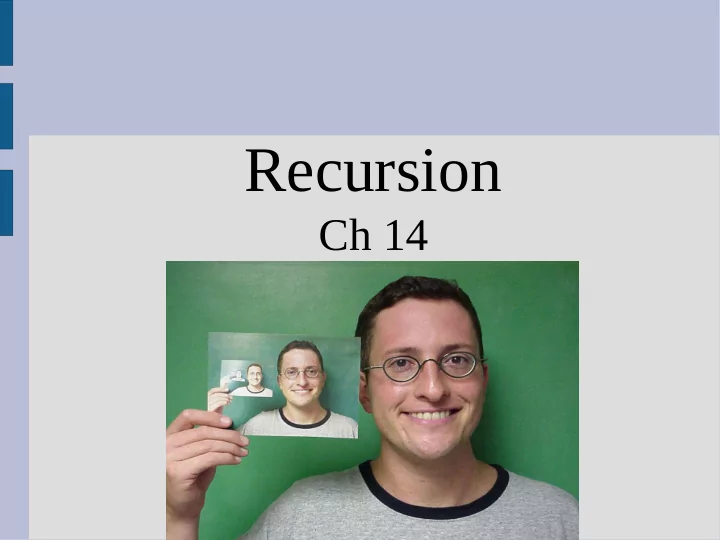

Recursion Ch 14
Announcements Midterm graded on gradescope
Highlights - recursion
Recursion No fancy blue words or classes this chapter Recursion is simply calling a method from inside itself This copy will re-run the method on any new arguments or information (See: badRecursion.cpp)
Recursion If you forget your stopping case, you will not get an infinite loop but crash the program This is because every function call takes up more memory, so you constantly ask for more memory Eventually the memory (stack) cannot store anymore
Recursion
Recursion basics Good recursion must have 2 parts: - A recursive call on a smaller problem - An ending case (see: https://www.youtube.com/watch?v=-xMYvVr9fd4) In order to use recursion, you must be able to identify a subproblem that is very similar to the original problem Each step must get you closer to the solution
Recursion basics For recursion, you can basically assume your function works as you want it to (even though you have not written it) If you have the ending case and reduction step correct, then it will!
Recursion: Family tree Person Descendant
Recursion: In words A child couldn't sleep, so her mother told a story about a little frog, who couldn't sleep, so the frog's mother told a story about a little bear, who couldn't sleep, so bear's mother told a story about a little weasel ...who fell asleep. ...and the little bear fell asleep; ...and the little frog fell asleep; ...and the child fell asleep. (See: story.cpp)
Recursion: Basic example Remember, code starts in main and runs from top to bottom in sequence (normally) When you call a function you go execute all the function's code is run before going back to the original code Code order is important in recursion! (See: stringRecursion.cpp)
Recursion What if I wanted to just count down to zero? countdown(5) would show: 5 4 3 2 1 0! (see: countdown.cpp)
Recursion There are two important parts of recursion: -A stopping case that ends the recursion -A reduction case that reduces the problem What are the base and stopping cases for the Fibonacci numbers? (sum of the previous two numbers) (see last time: fibonacciRecursion.cpp)
Recursion: Root finding Find a root of: (see: rootFind.cpp) Method: 1. Find one positive y and 1 neg. y 2. Find midpoint (of x values) 3. update y-pos/neg
Recursion How would you sum the numbers 1 to n using recursion (not a loop)? For example sumToN(5) = 15, as 1+2+3+4+5 = 15 What is the stopping case? How do you reduce the problem? (see: sumToN.cpp)
Recursion What if we defined tangent recursively as: Assume we take an input for how many times to do this recursion What is the pattern? What is the stopping case? How do we move towards the stopping case (see: tangent.cpp)
Recursion: Dictionary search Open the dictionary to the middle - If the word is not on that page, reopen in the middle of the unsearched side (See: dictionarySearch.cpp)
Recursion: Tower or Hanoi https://www.youtube.com/watch?v=2SUvWfNJSsM
Recursion: Tower or Hanoi The tower of Hanoi is played by: 1. Moving a single ring to another stack 2. Smaller rings cannot have larger rings on top of them (see: towerHanoi.cpp)
Recursion How would you solve a sudoku problem? Rules: 1. Every row has numbers 1-9 2. Every column has numbers 1-9 3. The nine 3x3 boxes have numbers 1-9 Reduce problem? Stopping case? (see: sudokuSolver.cpp)
Recursion Do not try to solve chess in this manner! You will segfault (you will also not finish computing before the sun burns the earth to a crisp)
Miscellaneous notes Try googling “recursion” and click on the spelling suggestion Recursion is very powerful and used in many advanced algorithms It will give you a headache for a while... =(
Recommend
More recommend